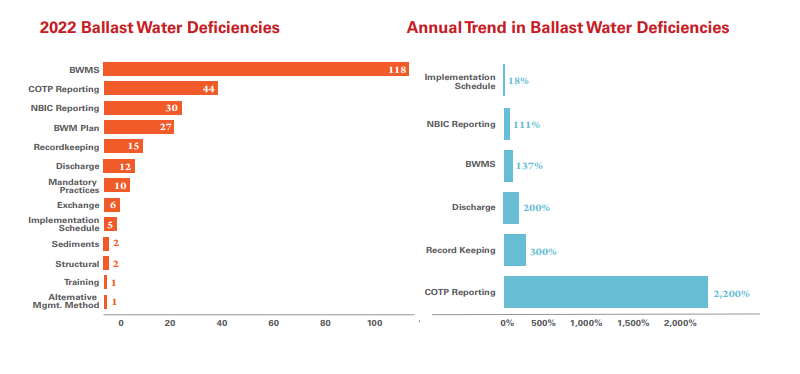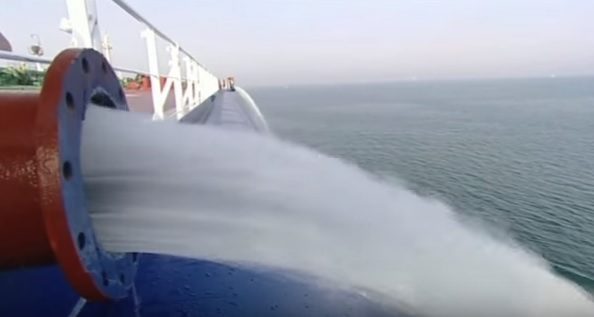In its annual Port State Control (PSC) report for 2022 released in late April, the US Coast Guard noted that compliance with ballast water management regulations continues to be one of the most challenging issues faced by the maritime industry.
In 2022, the Coast Guard issued 25% more deficiencies for noncompliance with the regulations over the previous year’s numbers. The majority of the deficiencies were issued to vessels with inoperable systems, deficient ballast water management plans, and failing to report mandatory ballast water practices to the National Ballast Information Clearinghouse (NBIC) within specified timeframes, much like 2020 and 2021.
Types of deficiencies
- BWMS: Deficiencies include both inoperable Coast Guard Type Approved systems and accepted Alternative Management Systems.
- COTP Reporting: Deficiencies are issued when a vessel fails to report an inoperable system to the USCG.
- Discharge: Deficiencies are issued when a vessel discharges non-compliant ballast water.
- Implementation Schedule: Deficiencies involve vessels that are past their compliance date and using an unapproved BWM method.
- Mandatory Practices: Deficiencies include failures to remove hull fouling organisms and marine growth as well as improper uptake of ballast water.
- Structural: Deficiencies record failures in ballast water tanks and associated piping.
On the positive side, the Coast Guard is seeing an increased trend of vessels reporting their inoperable systems prior to arrival. Additionally, the Enhanced Exam Program (EEP) contributed to identification of more discharges of non-compliant ballast water into the waters of the United States as well as showing an increase of non-reported inoperable ballast water systems.

EXPLORE MORE by reading uscg psc annual report here


































































I think it`s about time for member states to put pressure on the IMO to introduce radical changes to today’s ballast regulation. It is known that a lot of unwanted microorganisms and other pollutants still are being spreading, despite todays so-called strict rules. If we ever are going to stop this pollution completely, we must asap do something radical with today’s acknowledge ballast procedures and prohibit ships for using brought sweater as ballast. I see no other way out of this dilemma than to international deny ships from using water as ballast. There are currently alternatives available to today’s approved rinsing methods, rinsing methods that leeks, are easily to manipulate and hard to detect and most of all pollute the air more than it rinses the ballast. Methods that totally will eliminate the problem totally exist, but IMO, flag state and shipowners do not dare to take the first step by admitting that the only solution is to set a date to ban ships for using water as ballast and by that force the shipping world to come up with a sustainable lasting solution. For instant such as Ceobas.no